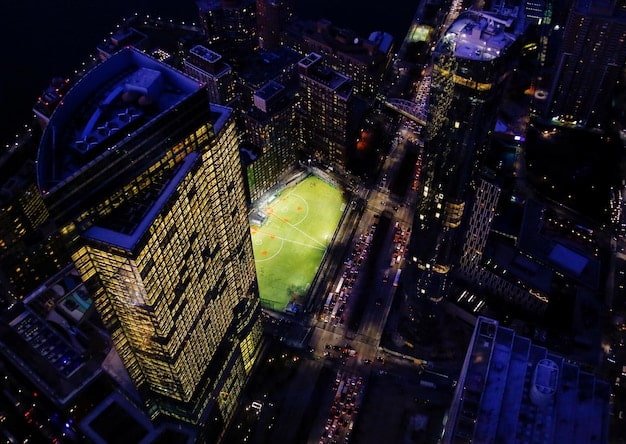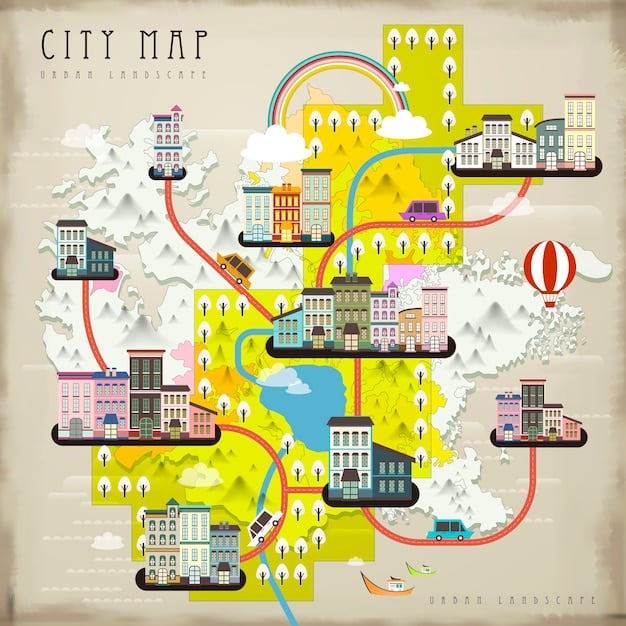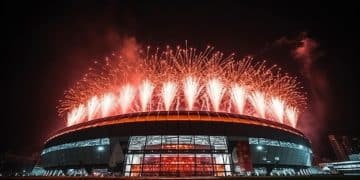World Cup 2026: Plan Your Trip to a US Host City

Planning your trip to a US host city for the 2026 World Cup requires strategic consideration of travel logistics, accommodation bookings, and understanding local transportation to ensure a seamless and enjoyable experience amidst the excitement of the global football event.
As the anticipation builds for the 2026 FIFA World Cup, hosted across North America, many fans are already envisioning their journey to a US host city. Planning for an event of this magnitude demands meticulous attention to detail, from securing tickets to navigating unfamiliar urban landscapes. This guide will delve into crucial aspects of how to plan your trip to a US host city, ensuring a memorable and hassle-free experience as you cheer on your favorite teams.
Selecting Your Host City and Understanding Venue Logistics
Choosing which US host city to visit for the 2026 World Cup is one of the initial, and perhaps most exciting, decisions for fans. With a diverse array of cities participating, each offers its own unique cultural flair, attractions, and logistical challenges. Researching the specific venues and their surrounding areas is paramount to an effective trip plan.
Each host city will have a designated stadium, often a large NFL or college football arena, adapted for soccer. Understanding the stadium’s location relative to urban centers, public transportation hubs, and potential accommodation zones is crucial. Some stadiums, while impressive, might be located on the outskirts of the city, requiring special transport arrangements or longer travel times.
Researching Host Cities: What to Consider
When you’re trying to figure out which city is best for your trip, think about more than just where the games are. Consider what else there is to do in the city, how easy it is to get around, and what kind of budget you’re working with. These factors can really shape your World Cup experience.
- Geographical Location: Will you stick to one region or travel between coasts? Remember the vast distances in the US.
- Local Attractions: Beyond the matches, what else does the city offer? Museums, parks, historic sites?
- Transportation Network: How robust is the public transport system? Are ride-sharing services readily available?
- Accommodation Availability and Cost: Prices will surge. Research early and consider options beyond traditional hotels.
Understanding the full scope of what each potential host city can offer will help you narrow down your choices effectively. It’s about balancing the football experience with the overall travel adventure, especially if you plan to extend your stay beyond match days.
Delving deeper, a city’s general atmosphere and local regulations also play a role. Some cities might have strict open container laws, while others are known for their vibrant pre-game celebrations. Being aware of these nuances can enhance your experience and help you avoid any unexpected surprises during your stay.
Securing Tickets and Accommodation: Early Bird Advantages
The demand for World Cup tickets is always immense, and 2026 will be no exception. Coupled with this, accommodation in host cities will become a premium commodity. It’s not just about booking early; it’s about being strategic and understanding the market dynamics surrounding such a global event.
FIFA typically manages ticket sales through various phases, including random draw applications, first-come, first-served periods, and last-minute sales. Registration for updates on ticket sales through official FIFA channels is the most reliable way to stay informed. Beware of unauthorized resellers, as counterfeit tickets are a risk.
Accommodation Strategies for Peak Demand
Booking your stay isn’t just about finding a room; it’s about securing a place that fits your budget, location preferences, and comfort needs amidst unprecedented demand. Hotels, short-term rentals, and even alternative lodging options will be highly sought after.
- Official Accommodation Packages: FIFA often partners with tour operators to offer packages that include match tickets and accommodation. These can be more expensive but offer guaranteed entry and lodging.
- Direct Hotel Bookings: Many hotels open bookings 12-18 months in advance. Utilize flexible cancellation policies if your plans are not yet firm.
- Short-Term Rentals (Airbnb, Vrbo): While offering more space and often character, be prepared for surge pricing and ensure the host has a good reputation.
- Alternative Lodging: Consider hostels, university dorms (if available during summer), or even camping outside urban areas if budget is a primary concern.
Beyond the well-known options, exploring newer accommodation platforms or even looking into home exchanges could provide unique and cost-effective solutions. The key is to be creative and open to different types of lodging that you might not typically consider for a standard trip.
It’s also prudent to consider the proximity of your accommodation to public transport routes connecting to the stadium. What might seem like a great deal initially could turn into a daily logistical nightmare if it requires extensive travel or multiple transfers within the city. Verify walking distances to key transport links and local amenities.
Transportation and Navigating US Cities
Navigating US cities, especially during a major event like the World Cup, presents its own set of challenges. Unlike some European cities with extensive metro systems, public transportation varies widely between US host cities. Planning your local travel is just as important as planning your international flights.
Many US cities rely heavily on public buses, light rail, and ride-sharing services. For stadiums located outside city centers, dedicated shuttle services might be provided, but these can also experience significant delays due to traffic congestion. Familiarizing yourself with the specific public transport apps and payment methods for your chosen city is essential.
Getting Around: Tips for Efficiency
To avoid getting stuck in traffic or struggling to find parking, understanding each city’s transportation infrastructure is critical. This knowledge empowers you to choose the most efficient and least stressful ways to get to your desired destinations, whether it’s the stadium or a local attraction.
- Public Transportation Apps: Download apps like Google Maps, Citymapper, or the local transit authority’s app for real-time schedules and route planning.
- Ride-Sharing Services: Uber and Lyft are widely available but expect surge pricing around match times. Consider pre-booking if possible.
- Walking and Cycling: For central city locations, walking or renting a bike (where available) can be a pleasant and efficient way to explore, avoiding traffic.
- Pre-purchasing Tickets/Passes: Many transit systems offer multi-day passes that can save money and hassle compared to single fares.
While renting a car might seem convenient, parking in urban areas, especially near stadiums, will be extremely limited and likely expensive. Factor in potential traffic jams on match days, which could turn short drives into long ordeals. Prioritizing public transport or ride-sharing is generally advisable.

Consider also the local pedestrian infrastructure. Some US cities are very walkable, with expansive sidewalks and pedestrian-friendly zones, while others might require more reliance on mechanical transport even for shorter distances. This detail can affect your daily comfort and overall experience.
Budgeting and Financial Planning for the World Cup
Attending the World Cup 2026 in a US host city will be a significant financial undertaking. Beyond the initial costs of tickets and flights, there are numerous other expenses that can quickly add up. A detailed budget plan is essential to avoid overspending and ensure you can fully enjoy the experience without financial stress.
Start by categorizing your potential expenses: flights, accommodation, match tickets, local transportation, food and drink, merchandise, and general touring. Research average costs for each category in your chosen host city. For instance, food prices can vary wildly from casual diners to upscale restaurants.
Cost-Saving Tips and Financial Considerations
Finding ways to save money doesn’t mean sacrificing the fun. It means being smart about your choices and looking for value where you can. Small savings in multiple areas can lead to significant overall reductions in your trip’s total cost, making the World Cup dream more accessible.
- Travel Rewards Programs: Utilize airline miles or hotel loyalty points if you have them. Sign up for credit cards that offer travel benefits if planning far in advance.
- Cook Your Own Meals: If staying in accommodation with kitchen facilities, preparing some of your own meals can significantly cut down on food expenses.
- Early Booking Discounts: Flights and accommodation are almost always cheaper when booked months in advance.
- Group Travel: Sharing costs for accommodation and even some travel can reduce individual expenses.
- Set Daily Spending Limits: Use cash for daily expenses to help stick to a budget, or track spending diligently through an app.
Exchange rates (if you’re an international visitor) and transaction fees for foreign card use should also be factored into your budget. Inform your bank of your travel plans to avoid card freezes. Having some local currency for small purchases is also a good idea.
Don’t forget to allocate a contingency fund for unexpected expenses, such as medical emergencies, lost luggage, or sudden plan changes. A buffer of 10-15% of your total budget can provide peace of mind and prevent a minor issue from becoming a major financial burden.
Cultural Immersion and Local Experiences
The World Cup is not just about football; it’s a global celebration that offers a unique opportunity for cultural exchange. While matches will be the main draw, immersing yourself in the local culture of your chosen US host city can significantly enrich your travel experience. Each city has its own distinct identity, history, and traditions.
Explore local neighborhoods beyond the main tourist zones. Seek out authentic eateries, visit community markets, and attend local events if they coincide with your visit. This not only offers a more genuine feel for the city but can also be a more budget-friendly way to experience local life.
Beyond the Stadium: Embracing Local Culture
To truly experience your host city, step beyond the typical tourist spots and dive into what makes each place unique. Engaging with local traditions and communities can create lasting memories that are just as vivid as the matches themselves.
- Local Cuisine: Sample regional specialties. Research local restaurants and food trucks known for authentic flavors.
- Museums and Art Galleries: Discover the city’s history and artistic expression. Many major cities offer free admission days or reduced rates.
- Parks and Outdoor Activities: Enjoy green spaces, walking trails, or even rent a boat if the city is near water.
- Live Music and Events: Check local listings for concerts, festivals, or community gatherings that might be happening during your stay.
Consider attending pre-match fan zones or cultural events organized by the host cities. These are often free and provide a vibrant atmosphere where fans from different countries can mingle, celebrate, and share their passion for football and their respective cultures.

Engaging with locals, even if just through simple conversations, can provide insights into hidden gems or local customs that guidebooks might miss. Being open and respectful of local customs and traditions will surely enhance your experience, making it more personal and memorable.
Safety, Health, and Practical Considerations
When traveling internationally, and especially to a large-scale event, personal safety and health should be top priorities. The US, while generally safe, has varying levels of urban crime, and being aware of your surroundings, particularly in crowded areas, is crucial. Additionally, understanding local health services is important for peace of mind.
Before traveling, ensure your passport is valid for at least six months beyond your planned departure date. Research visa requirements for the US, as these can vary significantly by nationality. For US citizens, familiarize yourself with Real ID requirements for domestic flights if you don’t have an enhanced driver’s license or passport card.
Ensuring a Safe and Healthy Trip
Taking proactive steps for your well-being not only makes your trip smoother but also prepares you for any unexpected situations. From health insurance to personal safety, awareness and preparation are your best allies.
- Travel Insurance: Comprehensive travel insurance is highly recommended. It should cover medical emergencies, trip cancellations, lost luggage, and other unforeseen events.
- Emergency Contacts: Keep a list of emergency contacts, including local embassy/consulate information, and share your itinerary with someone at home.
- Staying Hydrated and Sun-Safe: World Cup matches are typically during summer. Stay hydrated, especially during outdoor fan events, and use sunscreen.
- Awareness in Crowds: Be vigilant about pickpocketing in crowded areas like stadiums, public transport, and popular tourist spots.
- Medication: Carry any necessary prescription medications in their original packaging, along with a doctor’s note, and ensure you have enough for your entire trip.
Familiarize yourself with the 911 emergency number in the US for police, fire, or medical emergencies. Knowing where the nearest hospital or urgent care clinic is located to your accommodation can also be beneficial, even if you hope not to need it.
It’s also advisable to have a basic understanding of tipping culture in the US, as it differs from many other countries and can impact your service experiences. Planning for gratuities for services like dining, taxis, and hotel staff should be part of your overall budget.
| Key Aspect | Brief Description |
|---|---|
| ✈️ Travel Logistics | Book flights & accommodation early to avoid surge pricing and ensure availability. |
| 🏙️ City Navigation | Research public transport, ride-sharing, and stadium access for chosen host cities. |
| 💰 Budgeting Wisely | Plan for all expenses, including food, merchandise, and contingency funds. |
| ⚕️ Safety & Health | Secure travel insurance and stay aware of local emergency protocols. |
Frequently Asked Questions About Planning Your World Cup 2026 Trip
▼
Ideally, you should start planning your trip as early as possible, even now. This includes researching potential host cities, understanding ticket sale phases, and monitoring accommodation availability. Early planning is crucial for securing better prices on flights and lodging, as well as giving you ample time to refine your itinerary and address any logistical challenges that may arise.
▼
To maximize your chances of securing tickets, register on the official FIFA website for updates on ticket sales phases. Participate in the initial random draw applications, as these often offer the best odds. Also, consider official hospitality packages which often include guaranteed match tickets along with premium services and accommodation, though at a higher price point.
▼
The best transportation options vary by city. Public transit (subways, buses, light rail) is generally the most cost-effective and efficient, especially near stadiums. Ride-sharing services like Uber and Lyft are widely available but expect surge pricing on match days. For central areas, walking or cycling can be enjoyable and practical. Avoid renting a car if possible due to potential traffic and parking issues.
▼
A realistic budget depends entirely on your travel style and how many matches you plan to attend. For a single person attending a few matches, anticipate costs ranging from $3,000 to $8,000 USD or more, covering flights, tickets, accommodation, food, and local transport. Hotels will be a significant expense. Sharing costs with a group can help reduce individual expenses, making the trip more affordable.
▼
Absolutely, purchasing comprehensive travel insurance is highly recommended. It provides crucial protection against unforeseen circumstances such as medical emergencies, trip cancellations or interruptions, lost luggage, and travel delays. Given the significant investment involved in a World Cup trip, travel insurance offers peace of mind and financial security against potential disruptions and unexpected costs.
Conclusion
The 2026 FIFA World Cup promises to be an unparalleled spectacle, and with careful planning, your journey to a US host city can be as smooth and exhilarating as the matches themselves. From meticulous budgeting and securing your tickets and accommodation early to understanding local transportation and immersing yourself in the rich tapestry of American culture, every detail contributes to a memorable experience. By following these guidelines, you’re not just attending a football tournament; you’re embarking on a global adventure, ready to embrace the excitement and camaraderie that only the World Cup can offer.





